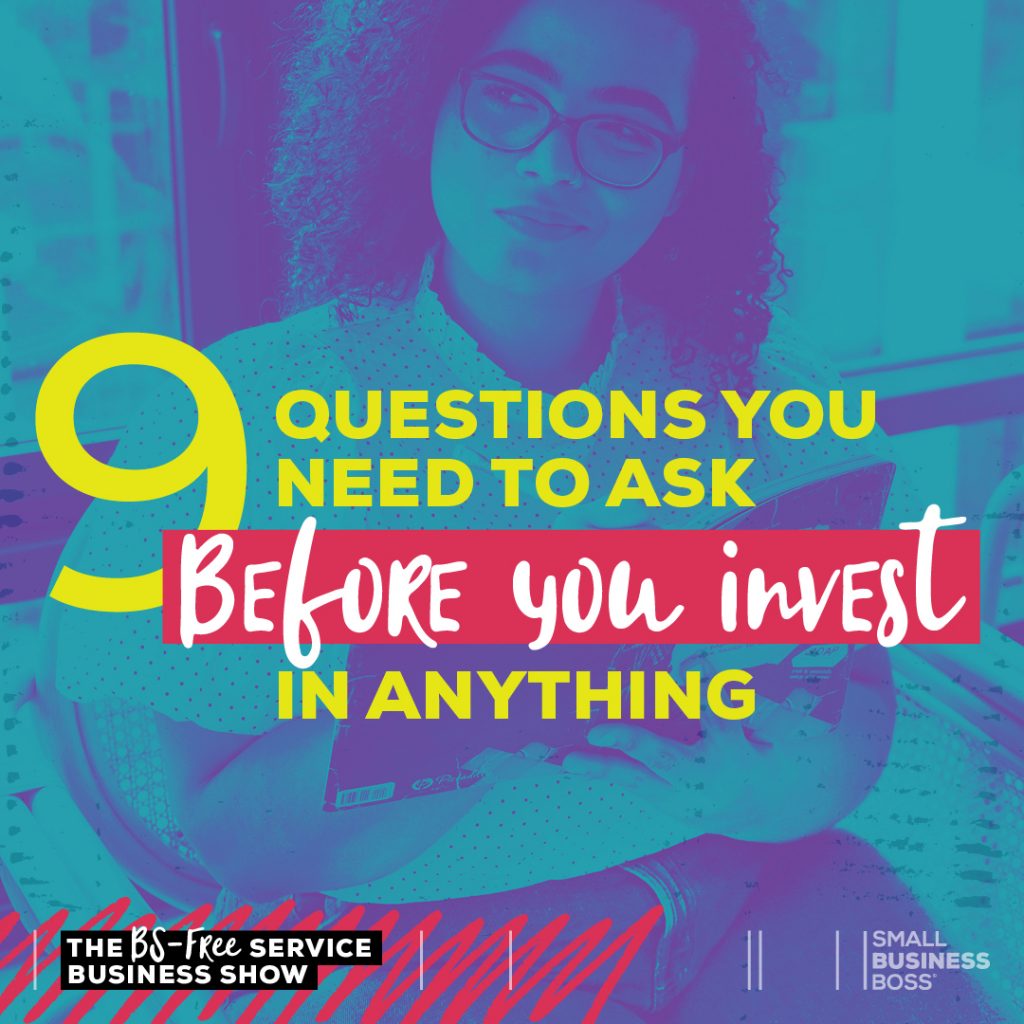
Search the site:
9 Questions You Need to Ask Before You Invest in Anything
As the saying goes, you need to spend money to make money, but is that really true? My take is that sometimes it is and other times we’d be better served by closing our wallets. In this episode, I’m sharing nine questions you need to ask before you invest in anything.
As a business owner, there are a lot of investments we make in our business. From our teams to trainings to masterminds, we’re constantly weighing out decisions about when, what and where to invest.
But what happens when you’re just not sure? And how do we make smarter investments?
One of the best things I’ve ever done business-wise is to create a budget, which has clear buckets for everything in my business. That helped constrain my possible options and helped me stick to a plan. But that only got me so far.
For example, each year I plan for any training, courses, masterminds or anything else I plan to invest in. I have a clear picture of what I plan to spend for the year. However, when push comes to shove, I know I have the money set aside, so I’m left having to evaluate each potential investment.
I know you’re up against the same. And on the heels of last week’s episode on the culture of celebrity entrepreneurship, I wanted to share how I evaluate potential investments in programs, courses and other training.
Having a list of questions like this has saved me from making a bad decision many times, and has helped ensure I’m making that decision from a place of critical thinking, not an emotionally-driven impulse purchase.
Table of Contents
#1. Who Do They Work With?
Oh, marketing. So slick. So shiny. It’s really easy for us to get excited over a course, program or even a mastermind because it’s just so appealing. It holds all the answers and plays on whatever our insecurity is in a given week.
Which is why you have to pause and ask, “who they work with?” For me, specificity here is key, as so many offerings cater to a broad cross-section of businesses. How can one person possibly work with service businesses, as well as coaches, e-commerce, and infoproducts.
The short answer: They can’t. And if they do, prepare yourself for some general advice. Which is fine if you’re focused on learning a specific tool or platform, but way less helpful if you’re looking for strategies that will work for your exact situation.
#2. What’s Their Business Model?
In the online business world, having a course or program is seen as the holy grail. And what that means is that many of the people out there “teaching” have ceased doing the things they teach.
For me, that goes to relevance. Tactics change, the market shifts, and if you don’t rely on making money from the same business model as I do, I’m not confident in your skills.
Harsh? Maybe. But here in 2020, I’m not sure how, if you’re not actually doing the thing, you can provide me with real-time feedback on said thing.
#3. What’s Their Business Background?
The internet is the home of the self-proclaimed expert, which I think we all know leads to a lot of unqualified people trying to sell you things.
Which is why I always try to take the time to dig into someone’s business background. And let me tell you, probably about 80% of the time, this is where my consideration stops.
While I want to judge people based on their actual offering, I need to know WHERE that information comes from and what qualifies them to be the one to teach it to me. Recycled content is a massive problem in this industry, and many people have the mentality that it’s okay to teach something you’ve done once.
When I invest in someone, I want to know they’ve done it more than once. Preferably for multiple years for multiple people.
#4. What’s My Expected ROI From This Investment?
Earlier this year, I did a full blog post on the ROI from my investments. While I had many winners, I had about a 50/50 success rate on getting ROI.
Which is why now, I carefully evaluate the potential ROI of any investments. I figure out what I’m expecting from that investment, and what it would take to make it a winner for me.
For example, I recently bought a course on Instagram. I took days to decide if I was going to spend the money or not, as I wanted to assess the potential ROI. After a couple days of thinking about it, I realized that the risk was minimal, and if I picked up a few things that made Instagram easier or more effective, it would be well worth it.
Defining your expected ROI will help you make better investments, and set a clear path for how to maximize the ones you do make.
#5. Do You Get Any 1:1 Support?
This may not be relevant for every situation, but I know for me, I need 1:1 support as much as possible. In some situations (especially in a larger group) I struggle to focus and get the support I truly need.
I’m at the point business-wise where I’ll pay extra for that 1:1 support where needed. And every single time I do, I’m pleased I did. That connection, face-time and attention on me and my business is priceless.
#6. Do You Identify With the People Featured in Testimonials?
This may seem like a weird one, but testimonials are designed to help us see ourselves as a success story. And if I look at the testimonials and immediately think “um, these aren’t my people”, that’s a red flag.
Other red flags I look for include testimonials that don’t seem at all believable. If everyone claims they’ve been able to 10x their results or investment, my BS meter goes off. The key for me is that they’re using the strongest believable claim, not one that immediately seems like it was fabricated or is simply too good to be true.
#7. Do You Like Them? Do You Trust Them?
Do you know how many times I ignored my gut on someone and gave them my money anyway? Many more times than I’d like to admit. And that’s why now, I only spend my money with people I like and trust.
This may sound super basic, but trust me. Marketers are so good that they override our critical thinking and play to our emotions. When we’re being played on an emotional level, it’s easy to overlook red flags or our gut.
In terms of trust, if they’re sharing income reports or making other claims, ask yourself if they’re legit. Do they provide receipts? Does the math work, or does it seem like there’s been some artistic license used? (Okay, are they lying? I’m trying to be kind here.)
Don’t let big numbers wow you. If they can’t back that up, think about if you can really take what they say at face value.
#8. Has the Business Changed Names?
Some of you are thinking, “what is she talking about?” So I’m going to share something that I don’t think is as well known as it should be.
Many shady online businesses simply disappear. Then they return later with a new brand, new name, and sometimes even the person owning that business has a new name. I wish I was joking but I’ve seen this one play out many times, and quite frankly, it’s terrifying.
This is why if you’re not super familiar with a brand, you should spend some time Googling them. Search them on Twitter, Facebook and Reddit. You may be surprised at what you may discover.
#9. What’s Their Business DNA?
Finally, understanding who your teacher’s teachers are is essential. This one is critical in the online business world, thanks to the culture of celebrity entrepreneurship.
Where did they learn this? How did they get into business? Who helped them along the way?
Ask questions. Think critically. Especially with the latest and greatest overnight success story. If you’re tempted to jump on their bandwagon, dig into their DNA.
You may quickly find that their story isn’t quite what it seems, and that their business practices are rooted in ones that you want nothing to do with. For example, if someone learned everything they know from the hard core dude bro marketer you loathe, maybe that should give you pause.
Carefully Evaluate Before You Invest and Save Your Money
Making better investments in your business starts with having a framework like this to work through. This can literally help save you from yourself, and save money in the process.
Remember, if you’re tempted to buy something, that’s because marketing and sales tactics are doing their job. It’s up to you to do the rest and make an informed decision that’s right for your business.

I’m Maggie Patterson (she/her), and services businesses are my business.
I have 20+ years of experience with client services, am a consultant for agency owners, creatives, and consultants, and vocal advocate for humane business practices rooted in empathy, respect, and trust.
Read or Listen to the Latest
For Solo Business Owners

Growing a solo service business is tough.
It’s even harder when you’re bombarded with BS advice that steers you away from your values and why you started your business in the first place.
This is the podcast for solo creatives and consultants who want to remain as a team of one and have zero interest in the hustle and grind of typical business teachings.
Subscribe now and never miss an episode.
For Micro Agency Owners
Most podcasts for agency owners obsess over revenue growth as the ultimate success metric.

But here’s the truth: not everyone wants to make millions. Your goal might be to build a sustainable business that lets you have a life and doesn’t run you into the ground.
Join me as I spill my shameless confessions and share everything I’ve learned about building a micro agency that skips the BS of tired and typical agency teachings.
Follow Now on All Major Podcast Platforms








